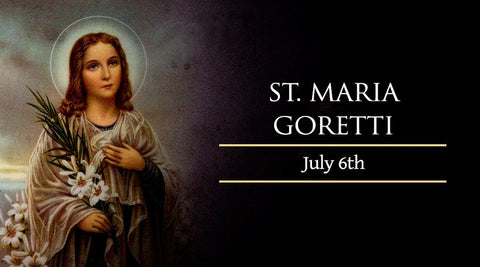In the annals of Catholic Church history, few stories resonate with the dramatic intensity of forgiveness and redemption as the story of St. Maria Goretti, whose feast we celebrate on July 6, and Alessandro Serenelli. Recognized as a model for purity and youthful piety, Maria's story is not just one of innocence and faith, but also of a forgiveness so profound, it transformed the life of Alessandro Serenelli, her attacker.
Maria Goretti, born in 1890 in Italy, was known for her piety and commitment to her faith, even at a young age. Alessandro Serenelli, a few years her senior, came from a much more troubled background. His father passed away when he was young, and his mother struggled with mental health issues. Their lives intersected when Alessandro's family moved in as tenants at the Goretti's farm.
The Tragic Event
It was a hot summer day on July 5, 1902. Maria was sitting on the outside stairs of her home, mending a shirt. Her mother and siblings were out working in the fields, while her father had passed away a year earlier. Alessandro, spotting an opportunity, approached Maria with dishonorable intentions. Maria resisted, clinging to her faith and commitment to purity.
In this ordinary home setting, an extraordinary struggle ensued. Maria, though physically weaker, held a profound spiritual strength. She vehemently opposed Alessandro, crying out that what he wanted to do was a mortal sin and that he would go to hell.
Alessandro, driven by rage and frustration at Maria's firm refusal, pulled out a knife and stabbed her repeatedly. Eleven times the knife came down, each time Maria reiterated her refusal, until she fell, critically wounded. Despite the brutal attack, Maria's faith remained unshaken. When found and taken to the hospital, she clung to life for another 24 hours.
In those agonizing hours, Maria demonstrated a sanctity far beyond her years. When asked by the attending priest if she forgave her attacker, she responded with a grace that touched everyone present. "Yes, for the love of Jesus I forgive him... and I want him to be with me in Heaven."
Alessandro's Imprisonment and Conversion
Alessandro was quickly apprehended and, showing little remorse, was sentenced to 30 years in prison. It seemed like the end of the road for Alessandro; however, Maria's prayer was not in vain. Several years into his sentence, Alessandro reported a life-changing vision: Maria appeared to him in a dream, offering him 14 white lilies, symbolizing the wounds he had inflicted upon her. This experience led to a profound transformation in Alessandro, who began to feel deep remorse for his actions and decided to turn his life around.
After serving 27 years, Alessandro was released. His first act as a free man was to seek out Maria's mother, Assunta. In an incredible act of grace, Assunta forgave him, saying if Maria could forgive him on her deathbed, how could she not do the same? Alessandro spent the rest of his life in a Capuchin monastery, living as a lay brother and often speaking about Maria's purity and sanctity. He turned his life around in the most unexpected ways, paying homage to the young saint who had forgiven him.
The Impact of Their Story
The story of Maria Goretti and Alessandro Serenelli has a profound impact on the Catholic Church and its believers. It illustrates the transformative power of forgiveness, repentance, and redemption. Maria was declared a martyr by the Church and was canonized in 1950. Alessandro lived long enough to see Maria's canonization, a living testament to the power of her forgiveness.
The story of St. Maria Goretti and Alessandro Serenelli serves as a powerful narrative of divine grace and redemption. It underscores the depth of Maria's faith and her ability to forgive even in her dying moments. It also shows us that no one is beyond the reach of forgiveness and transformation. While we remember St. Maria Goretti for her purity and saintly virtues, let us also remember her as an emblem of grace that changed a sinner into a penitent believer. As we remember her on her feast day, let her story inspire us to practice forgiveness and hope for redemption in our own lives.

